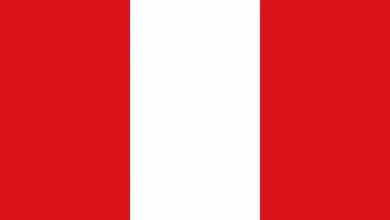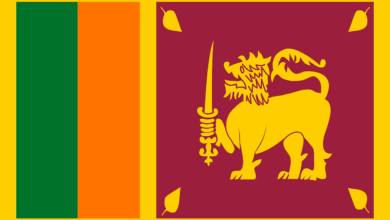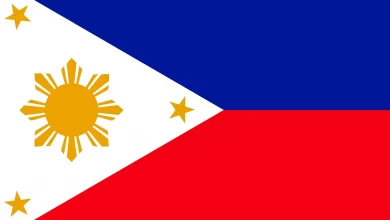Canada encompasses the majority of North America’s northernmost territory. The country is bounded on the east by the North Atlantic Ocean, on the west by the North Pacific Ocean, and on the north by the Arctic Ocean. It has some of the most beautiful landscapes and cities in the world. Canada is the Western Hemisphere’s largest country. Canada is divided into thirteen sub-national divisions, ten provinces, and three territories. Each province has its own local government system. So here are 59 amazing facts about this heaven on earth.
- The name Canada comes from the Huron-Iroquois word Kanata, which means village or a settlement.
- Canada shares borders with Alaska in the west and by 12 states of the United States in the south. Whereas it also shares maritime borders with Greenland, Saint Pierre, and Miquelon, which is an island that belongs to France.
- The border between unites states and Canada is officially known as the international boundary, is the world’s longest un-militarized border among the two countries. The border stretches about 8,892 Km (5525 miles), including 2,475km (1,537 miles) between Alaska and Canada.
- Canada did not have a national flag until February 15, 1965, when its maple leaf flag was adopted by the parliament. Before choosing the flag, a maritime flag was in use.
- Canada is home to some large animals like the moose and grizzly bear; it is also home to some 11,000 species of spiders and mites and about 55,000 insect species.
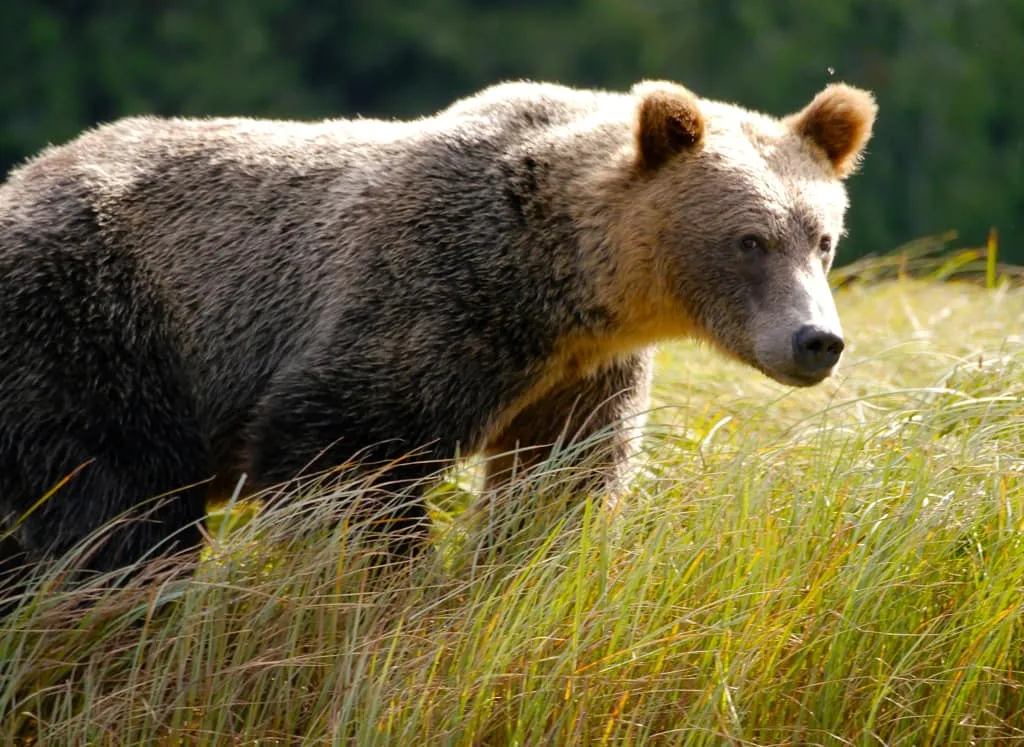
Grizzly bear of Canada - Canada is the second-largest country on the planet, just behind Russia. Its population density is just 8.6 people per square mile, which makes Canada the ninth most sparsely populated country on the planet.
- Vikings settled the east coast of Canada around the year A.D 1000. In 1960 archaeologists found evidence of the settlement of Vikings at l’anse aux Meadows, Newfoundland.
- The area of Newfoundland was the first part of Canada to be explored by the Europeans. However, in 1849 it became the last area to be a province.
- Canada became a country on July 1, 1867, when the British parliament passed the British North America act.
- Ice hockey and lacrosse are the country’s national sport. The game ice hockey was developed in Canada and has been played there since the 10th century.

Winters National Sports Ice Hockey - Lacrosse was declared as a national sport in the Montreal gazette in 1877. However, in 1994 Canadian national sports act was passed by the parliament of the country and declared lacrosse as the summer national sport and ice hockey as the winter’s national sport.
- The minimum temperature ever recorded officially in Canada was −63 °C(−81.4 °F ) in the snag, Yukon province, in 1947. While the highest temperature officially recorded in Canada is 45 °C (113 °F) on July 5, 1937, at Midale and at Yellow Grass.
- Canada contains 9% of the world’s total renewable water supply. While they have just 1 percent of the total world population.
- There are many famous authors from Canada, some of which are Lucy Maud Montgomery (Anne of green gables), Margaret Atwood (the handmaid’s tale), and Alice Munro (lives of girls and women).
- Canada has the longest coastline of any other country on the planet. The total coastline is about 202,080 km (125,567 miles).

Coast at Nova Scotia in Canada - A black bear was donated by Canada to the London zoo in 1915, became very popular, and also became the most popular attractions of the zoo. It was the favorite of Christopher Robin Milne and inspired the stories written by his father, A.A Milne about the Winnie-the-pooh.
- Canada has made a significant contribution to rock and roll, beginning with “Sh-Boom” by the Crew-Cuts in 1954, and with the help of music, the country got popular and got itself recognition as a country. Some Other famous Canadian rock-and-rollers who contributed to the music are Neil Young, Paul Anka, The Guess Who, Bachman Turner Overdrive, Avril Lavigne, Steppenwolf, Rush, Bryan Adams, and Barenaked Ladies.
- There are about 5.7 million golfers in the country. Among all the golfers, 71.4% golfers are male, 28.6% are female.
- The national animals in Canada of the country is the Canadian horse and beaver.The beaver was designated as a national symbol in 1975, while the Canadian horse was designated as a national symbol by the Canadian government in May 2002.The Canadian horse signifies resilience, intelligence, endurance, and great strength.
- The national symbol of the country is the maple tree leaf.

Coast at Nova Scotia in Canada - There is a true desert in Canada which is located in Osoyoos, British Columbia.
- Canada issues $1 and $2 in the form of coins. So the $1 is nicknamed “loonie” it is because the coin contains a loon on it. While the $2 is nicknamed “twonie” because it is equivalent to two “loonies.”
- According to a survey in Canada, the most productive day for work is considered Tuesday.
- There are more subway restaurants in the country compared to McDonald’s restaurants and Starbucks combined. However, the biggest fast-food chain in-country is held by Tim Hortons, and the subway comes on the second spot.
- There are more recreational golfers per capita in the country than any other country on the planet.
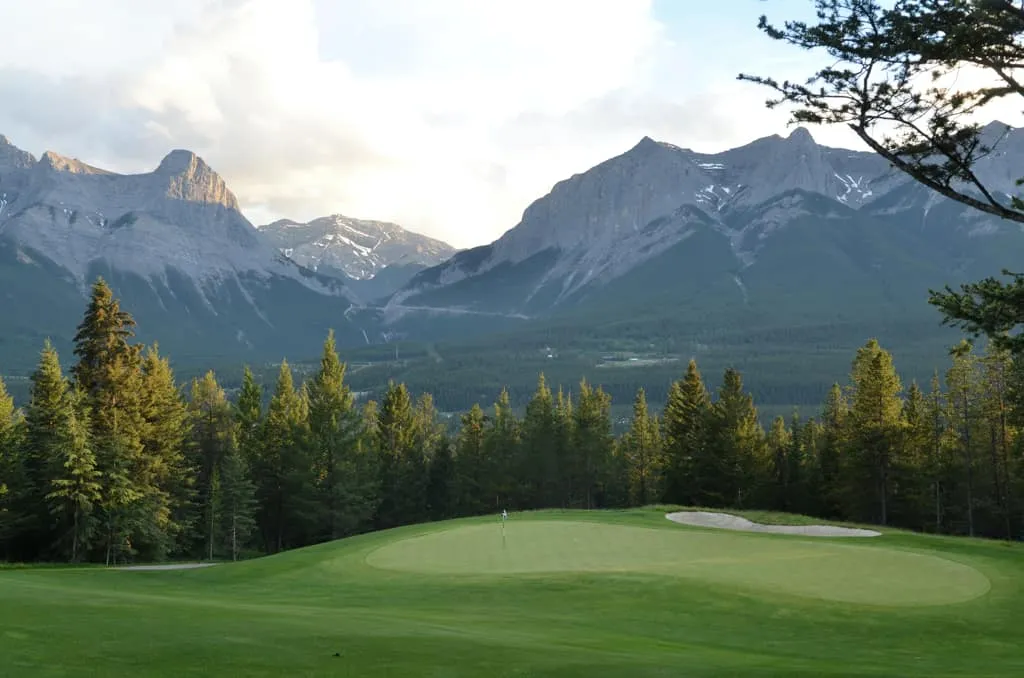
Golf Course in Canada - Since the 1930s and for three decades, people of Canada and Denmark have been fighting over an uninhabited island called as hans islands. They are fighting for the land by leaving each others bottles of alcohol and changing flags.
- In Canada, the banknotes have braille-like markings on them so that blind can recognize the notes figures. Some other countries that practice the same are Mexico, India, Russia, and Israel.
- Lake Superior is the largest freshwater lake by surface area and the third-largest lake by volume on the entire planet. While the great bear lake, located in the boreal forest, is the largest lake in Canada, the fourth largest in North America, and stands at the eighth spot in the world.
- Canada celebrates Tartan Day every year on 6th april. On this day celebrations are done in the form of parades with pipe bands, highland dancing and sports, and other community gatherings with Scottish-themed events. While a variety of tartans are displayed, the maple leaf tartan is Canada’s official tartan.
- Canada has more inland waters and lakes than any other country on the planet. The country has over 31 lakes that cover more than 1,300 sq km (500 sq miles) of land.
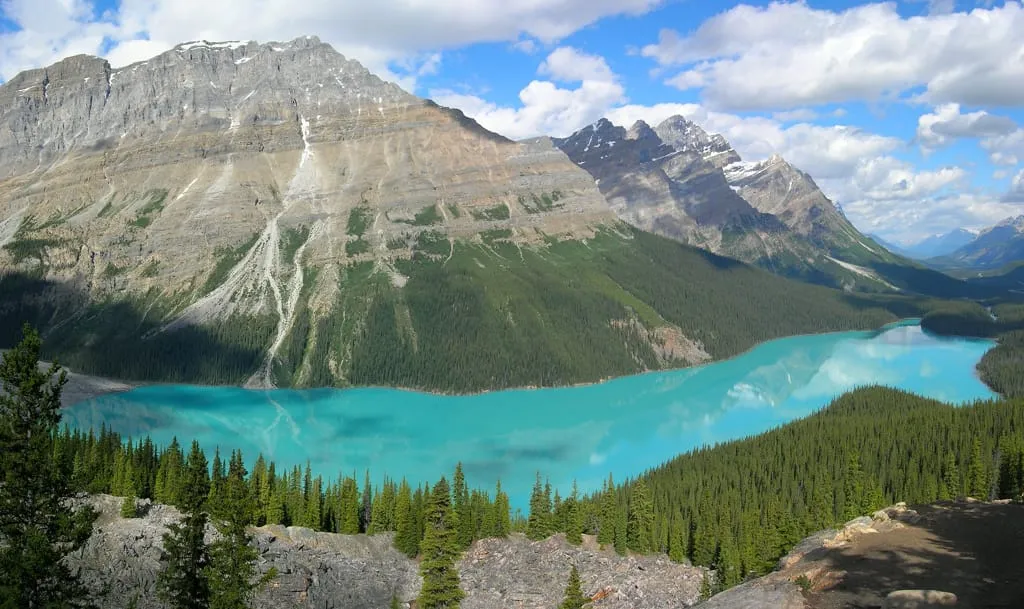
Tobias Alt, Tobi 87 via Wikimedia Commons (Peyto Lake in Alberta Province) - The place called Alert, in the Qikiqtaaluk Region, Nunavut, Canada, is the most northernmost permanently inhabited place in the world, the latitude of the place 82°30’05” north, and it is just 817 kilometers (508 mi) away from the North Pole.
- The saint john street of New Brunswick in Canada is one of the steepest main streets. The street rises about 80 feet in the distance of just two blocks.
- Canada is a major consumer and producer of cheese. In 2019, Canada produced about 515 million kilograms of cheese. The majority of cheese produced was firm cheese rather than hard or soft cheese. The cheddar and mozzarella cheese were among the most produced cheese.
- Canada is the 12th largest export economy in the world and the 24th most complex economy of our planet.
- Canada became the second country in the world to legalize the use of cannabis. The country legalized it partially and for medical use since July 30, 2001, but on June 18, 2018, the parliament house amended the bill to fully legalize it.

Legalization of Cannabis In Canada - The national tree of the country is maple which is a species of flowering plant in the lychee and soapberry family. It is native to the hardwood forest in eastern Canada.
- The top exports of the country which contributed to the economy are Crude Petroleum ($54.1 Billion), Cars ($46.5 Billion), Refined Petroleum ($11.5 Billion), Vehicle Parts ($10.4 Billion), and Petroleum Gas ($10.2 Billion).
- The top imports of the country are Cars ($28.5 Billion), Delivery Trucks ($15.6 Billion), Refined Petroleum ($12.1 Billion), Crude Petroleum ($10.8 Billion), and Computers ($7.19 Billion).
- Canada has about 347 million hectares of forest land, which is about 9 % of the total forest area of the world. Canada stands at 3rd spot in the entire planet to have so much land covered in forest.
- The country is so big that you can fit the entire European union inside Canada.

Ssolbergj via Wikimedia Commons (Whole European Union Can fit into Canada) - Canada is the third topmost country in the world to have the largest oil reserves, just after Venezuela and Saudi Arabia. The country has about 171 billion barrels in reserves. The Alberta province holds about Ninety-five percent of the total oil reserves of the country.
- The Quebec city of Canada is the only walled city in the entire North American continent.
- Ninety percent of the total population of the country lives within the 100 miles radius of the united states and the Canadian border.
- Canada is the most educated country in the world. The second most educated country is japan, and the third is Israel.
- The Yonge Street of Toronto is the longest street on the planet. The street is about 56 Km (35 miles) long.
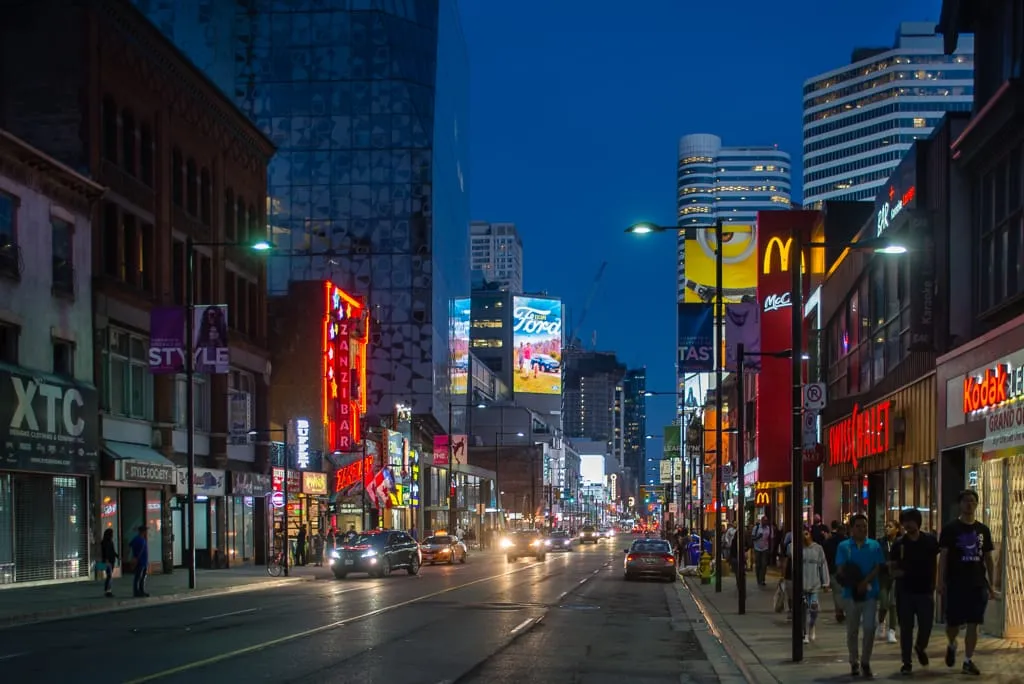
Ssolbergj via Wikimedia Commons (Yonge Street of Canada) - After Japan attacked pearl harbor on December 7, 1941, Canada became the first country to declare war on Japan even before the United States.
- Canada has less gravity than it is supposed to have. The reason for this has puzzled scientists for decades. So if you will weight yourself in the country, you might weigh less.
- Pan American Highway system is the world’s longest highway system. It stretches over 25,750 Km(16,000 miles). Persons who take on the entire route of this highway cross through 16 countries, including the United States, Canada, Mexico, Costa Rica, and Peru.
- Montreal is the second-largest French-speaking city in the world after Paris.
- Canadian police issue positive tickets to the people who do something well.

North Charleston, SC, United States, via Wikimedia Commons (Positive Ticketing System in Charleston) - According to a 2018 survey by Dalhousie University, 9.4 percent of Canadians are vegetarian. Over the past 15 years, the number of vegetarians has grown from 900,000 to 2.3 million.
- The capital city Ottawa is the second coldest capital of the world, just after Moscow.
- The majority of the world’s polar bears live in the country. However, they are at risk of becoming endangered due to climate change.
- Mount Logan is the highest mountain in Canada and the second-highest peak in all North America, just after Denali. The elevation of the mountain is about 19,551 ft (5,959 meters).
- Manitoulin Island is the world’s biggest freshwater island in the world. It is located in Lake Huron in Laurentia.
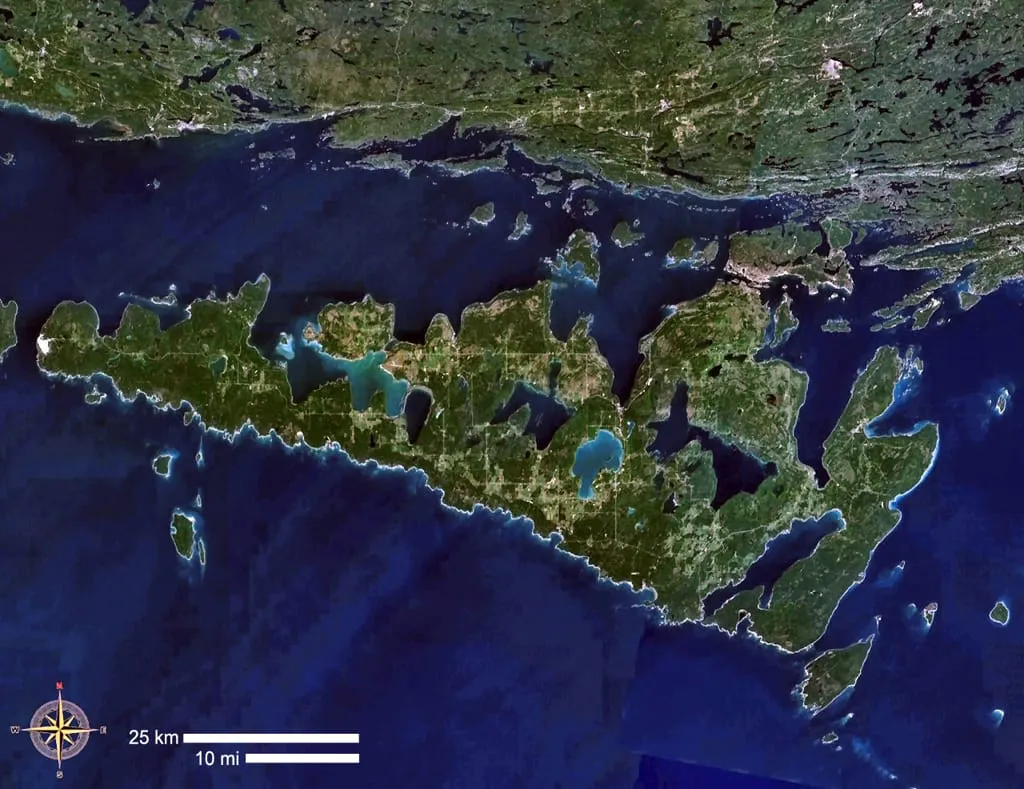
NASA WorldWind via Wikimedia Commons (Manitoulin Island) - There is a beach located on the shores of Georgian Bay at the mouth of Nottawasaga River which is about 40 km northwest of Barrie. This beach is the longest freshwater beach in the entire planet.
- Canada is the second-largest producer of uranium in the world, just after Kazakhstan. The country produced about 7001 tonnes of uranium in 2018.
- In January 2020, there were about 3.556 million beef cows and approximately 981,300 dairy cows in the country.
- According to a research 86 percent of Canadian adult says that they are either very happy or happy. The country has achieved the 9th spot in the whole world in terms of happiness.
- There are over 1700 waterfalls in the country out of which the Della falls is the highest. It has a vertical drop of 1,445 feet (440 m) and is formed by the glacier-fed lake.
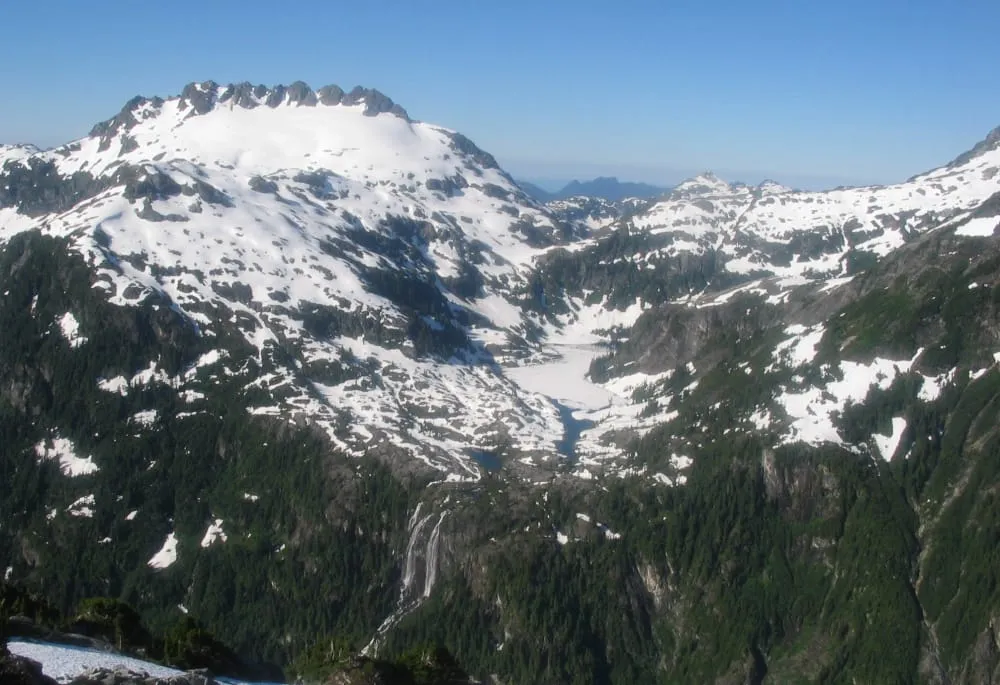
Fraser.harris via Wikimedia Commons (Della Lake and Falls)
Quick Facts about Canada
- CAPITAL CITY: Ottawa
- POPULATION: 3.76 Crore
- POPULATION RANK:98th
- LARGEST CITY: Toronto
- OFFICIAL LANGUAGES: English and French
- GDP NOMINAL:$1.73 trillion
- GDP RANK: 17th
- CURRENCY: Canadian dollar (CAD)
- FOUNDED: 1 July 1867
- FATHER OF THE NATION: Keith Williams
- TOTAL AREA: 9.985 million km2
- AREA RANK: 2nd worldwide
- CONTINENT:North America
- AVERAGE LIFE EXPECTANCY:82.25 years
- ARMY STRENGTH:40000 personnels
- ARMY RANK: 24th
- LITERACY RATE: 99 Percenet
- PER CAPITA INCOME: 50,810 PPP dollars (2019)
References
- Wikipedia-Canada
- Britannica-Canada
- Currentresults.com
- Examveda.com
- Wikipedia-Extreme Temperatures in Canada
- Investopedia.com
- Canadagolfs.ca
- Books.google.co.in
- Scrapehero.com
- Businessinsider.in
- Globalfirepower.com
- oec.world-Canada Imports and Exports
- BBC.com
- Nsenergybusiness.com
- vox.com
- Richardlangworth.com
- Cntraveler.com
- Wikipedia-Vegearianism by country
- Wikipedia-Vegearianism by country
- Wikipedia-Mount Logan
- Wikipedia-List of countries by Uranimum Production


